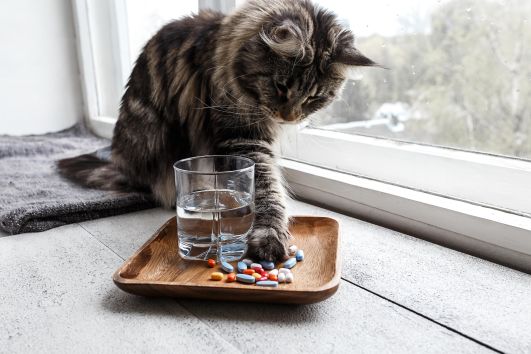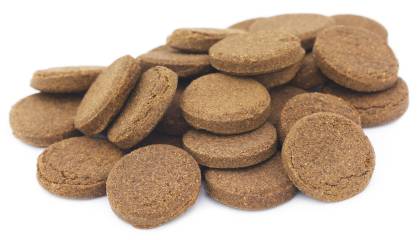Connect with a verified veterinarian in minutes. Licensed vets are available 24/7 to answer your questions. No need to worry about your furry family member.
Many pet parents take medications to treat their health issues. And this can be a problem if you have a cat. Your fur baby may see you “eating” the medicine and decide she’s missing out on something yummy! But what happens if a cat eats your medication?
Has your cat eaten your medication? Are you worried your medication will make your cat sick? If so, you’ve come to the right place. We understand it can be scary when your cat eats something like this.
We’ve gathered information about human medications and whether they can make a cat sick. Let’s get started!
Human Medications
Many human medications are toxic to cats, including the following:
NSAIDS
NSAIDs are non-steroidal anti-inflammatory drugs that are used to reduce fever, pain, and other issues. These are some of the most common medications many pet parents have around the house.
Acetaminophen
Acetaminophen is another drug that’s used to treat pain and fever. This also a common medication that you may have in the medicine chest.
Pseudoephedrine
Pseudoephedrine is a decongestant medication used to treat stuffy noses and congestion caused by flu, colds, and allergies.
Diabetes Medications
Diabetes medications treat the symptoms caused by diabetes in humans; they help control blood sugar.
Anti-depressants & Anti-Anxiety Medications
Anti-depressants and anti-anxiety medications are used to treat anxiety in humans.
Statins
Statins are used to lower cholesterol in humans.
Blood Pressure Medications
Blood pressure drugs are used to lower blood pressure in humans.
There are many other medications that people take; there are too many to list here. But the essential takeaway is that human medications are toxic to cats. Not only are they toxic to cats, but they are also at doses that are much too high for a cat.
Symptoms of Medication Ingestion in Cats
You may notice these symptoms if your cat has eaten your medication:
- Elevated or lowered heart rate
- Breathing difficulties
- Upset stomach
- Diarrhea
- Vomiting
- Excessive drooling
- Lethargy
- Excitability
- Loss of coordination
- And more
If you notice these or other symptoms in your cat, call the vet immediately. This is an emergency.

Review symptoms, medications & behavior to keep your pets healthy with a Vet Online in just minutes.
Ask a Vet Live NowTreatment of Medication Ingestion in Cats
Treatment depends on the medication your cat has eaten and her symptoms. The vet will treat symptoms as they arise, and your fur baby will probably require an IV for fluids and to administer medications.
The prognosis is best for cats who receive prompt medical treatment after eating human medications. If your cat tries to eat your medication, be sure to store your medicines out of your cat’s reach. This may mean locking your medication in a cabinet to keep your cat out. Prevention is always the best medicine!
Connect with a verified veterinarian in minutes. Licensed vets are available 24/7 to answer your questions. No need to worry about your furry family member.

Tom
Tom has always loved to write since he was little - he wanted to be either a writer or a veterinary doctor, but he ended up being a professional writer while most of his works are based on animals. He was born in San Francisco but later moved to Texas to continue his job as a writer. He graduated from the University of San Francisco where he studied biotechnology. He is happily married and a soon to be father!
Review symptoms, medications & behavior to keep your pets healthy with a Vet Online in just minutes.
Ask a Vet Live Now




